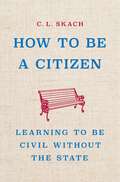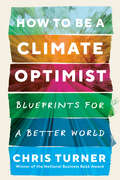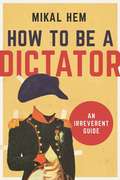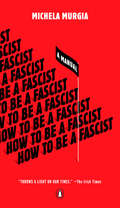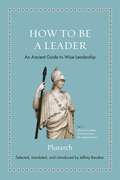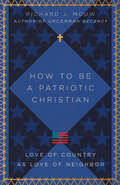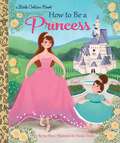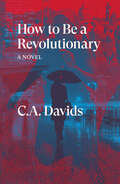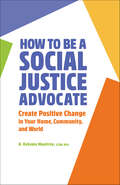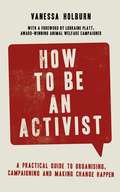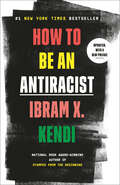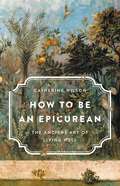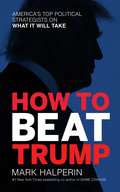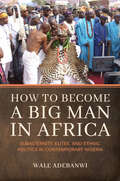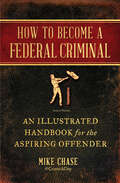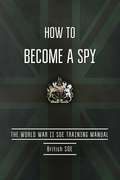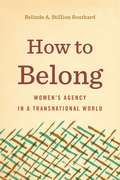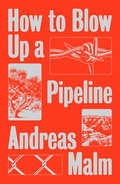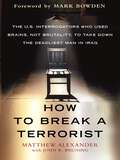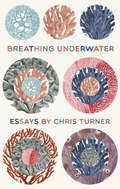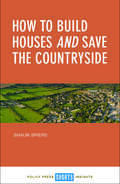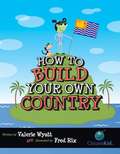- Table View
- List View
How to Be a Citizen: Learning to Be Civil Without the State
by C. L. SkachAn expert on the writing of constitutions argues that the path to a thriving society begins with forgetting about them: "Not James Madison but Bob Dylan or Annie Lennox should be our guide" (Mark Tushnet). In 2009, constitutional scholar C. L. Skach went to Iraq to help revise the constitution. She survived a missile barrage in the Green Zone—an event that proved a breaking point in her thinking about constitutions. In short: they don&’t really work. In How to Be a Citizen, Skach calls to move beyond constitutions. She argues that just as complex natural systems spontaneously generate order, we can, too. Looking to pandemic gardens, Reggio-Emilia schools, and community-driven safety patrols, she envisions not government by force, but society that is local, cultivated, and true. Grounded in six principles as simple as a call to spend time on a park bench, this book shows how community spaces, education, and markets can be reshaped to nurture cooperation and encourage flourishing. Equal parts personal, philosophical, and practical, How to Be a Citizen invites us to see society not as something imposed by law, but rather something we create together.
How to Be a Climate Optimist: Blueprints for a Better World
by Chris TurnerFrom the National Business Book Award winner and GG finalist, a very different book about facing the climate crisis, and what awaits us on the other side.Chris Turner has reported from the places where the sustainable future first emerged—from green islands in Denmark and green office parks in southern India, to solar panel factories in California and idealistic intentional communities from Scotland to New Mexico. Here, he condenses the first quarter century of the global energy transition into bite-sized chunks of optimistic reflection and reportage, telling a story of a planet in peril and a global effort already beginning to save it. This is a book that moves past the despair and futile anger over ecological collapse and harnesses that passion toward the project of building a twenty-first century quality of life that surpasses the twentieth-century version in every way. How to Be a Climate Optimist overflows with possibility in a moment of great panic, upheaval and uncertainty over a world on fire.
How to Be a Dictator: An Irreverent Guide
by Mikal HemA Tongue-in-Cheek Guide to Becoming a Dictator, Based on the Outrageous, Scandalous, and Excessive Behavior of Dictators Past and Present Who hasn’t dreamed of one day ruling your own country? Along with great power comes unlimited influence, control, admiration, and often wealth. How to Be a Dictator will teach you the tricks of the trade-how to rise to the top and stay in power, and how to enjoy the fruits of your excellence.Featuring examples from the most successful leaders and regimes in the business, including Kim Jong Il, Robert Mugabe, Muammar Gaddafi, Nicolae Ceausescu, François "Papa Doc” Duvalier, and many others, this handy guide offers ten easy lessons on becoming and acting like a dictator from how to rig an election and create your own personality cult to the dos and don’ts of dictator fashion. Other topics include: how to become wealthy and spend your fortune, sleeping around, expressing your literary genius, and how to avoid being toppled, exiled, and or meeting any other dismal end. Combining black humor with political insights, How to Be a Dictator is peppered with horrifying and hilarious stories from some of the most eccentric modern world leaders.
How to Be a Fascist: A Manual
by Michela MurgiaThe first and only guide to turning your 21st century democracy into a fascist paradise.Democracy is difficult, flawed and unstable. It involves barely distinguishable political parties taking part in lengthy, overcomplicated and expensive decision-making processes. Trying to engage so many people with political issues seems to lead only to complexity and disagreement. So why bother? Doesn't fascism guarantee a more effective and efficient management of the state?In this short, bitingly ironic mixture of On Tyranny and The Psychopath Test, Italian political activist Michela Murgia explores the logic that is attracting increasing numbers of voters to right-wing populism. Far from its origins in the 20th century, fascism is once again on the rise in an age of increased connectivity and globalism. Murgia shows how many of the elements of our society that we might think would combat closed-mindedness and xenophobia actually fan the flames. Closing with a "fascistometer" to measure the reader's own authoritarian inclinations, How to be a Fascist is a refreshingly direct, polemical book that asks us to confront the fascisim in our governments, in our societies, and in our own political leanings.
How to Be a Leader: An Ancient Guide to Wise Leadership (Ancient Wisdom for Modern Readers)
by PlutarchTimeless advice on how to be a successful leader in any fieldThe ancient biographer and essayist Plutarch thought deeply about the leadership qualities of the eminent Greeks and Romans he profiled in his famous—and massive—Lives, including politicians and generals such as Pericles, Alexander the Great, Julius Caesar, and Mark Antony. Luckily for us, Plutarch distilled what he learned about wise leadership in a handful of essays, which are filled with essential lessons for experienced and aspiring leaders in any field today. In How to Be a Leader, Jeffrey Beneker presents the most important of these essays in lively new translations accompanied by an enlightening introduction, informative notes, and the original Greek on facing pages.In "To an Uneducated Leader," "How to Be a Good Leader," and "Should an Old Man Engage in Politics?" Plutarch explains the characteristics of successful leaders, from being guided by reason and exercising self-control to being free from envy and the love of power, illustrating his points with memorable examples drawn from legendary Greco-Roman lives. He also explains how to train for leadership, persuade and deal with colleagues, manage one's career, and much more.Writing at the height of the Roman Empire, Plutarch suggested that people should pursue positions of leadership only if they are motivated by "judgment and reason"—not "rashly inspired by the vain pursuit of glory, a sense of rivalry, or a lack of other meaningful activities." His wise counsel remains as relevant as ever.
How to Be a Patriotic Christian: Love of Country as Love of Neighbor
by Richard J. MouwWhat does it mean to love our country?Some Christians see loyalty to America as central to our faith and identity. Other Christians are skeptical that our nation warrants such devotion or attachment. But Richard Mouw encourages Christians to have a healthy sense of national peoplehood that promotes civic kinship and responsible citizenship. He navigates between Christian nationalism on one hand and cynicism about country on the other to avoid the perils of both idolatry and disengagement.Mouw grapples with sticky questions such as how to honor national holidays in church and the place of protests in forging a more perfect union. Placing love of country in the context of Christian love of neighbor, he sees patriotism as an expression of our heavenly citizenship and a call to help our country be a place where all people can thrive in peace.Mouw's winsome and wise reflections direct our patriotic affections toward the civic good of others within our churches and in our communities. This guide helps us travel together on a shared national journey toward liberty and justice for all.
How to Be a Princess (Little Golden Book)
by Sue FliessA Little Golden Book about how to be a princess inside and out!Being a princess requires many skills, and now thanks to Little Golden Books, there is a way to learn them all. Join little Claire as she spends the day with a real princess, learning everything from how to boogie at the palace balls to helping those in need. Full of colorful illustrations and a playful rhyming story, children will be sure to give this delightful story a royal reception.
How to Be a Revolutionary: A Novel
by C.A. DavidsNamed one of ESSENCE's "9 South African Entertainers You Should Know"An extraordinary, ambitious, globe-spanning novel about what we owe our consciencesFleeing her moribund marriage in Cape Town, Beth accepts a diplomatic posting to Shanghai. In this anonymous city she hopes to lose herself in books, wine, and solitude, and to dodge whatever pangs of conscience she feels for her fealty to a South African regime that, by the 21st century, has betrayed its early promises.At night, she hears the sound of typing, and then late one evening Zhao arrives at her door. They explore hidden Shanghai and discover a shared love of Langston Hughes--who had his own Chinese and African sojourns. But then Zhao vanishes, and a typewritten manuscript--chunk by chunk--appears at her doorstep instead. The truths unearthed in this manuscript cause her to reckon with her own past, and the long-buried story of what happened to Kay, her fearless, revolutionary friend...Connecting contemporary Shanghai, late Apartheid-era South Africa, and China during the Great Leap Forward and the Tiananmen uprising--and refracting this globe-trotting and time-traveling through Hughes' confessional letters to a South African protege about the poet's time in Shanghai--How to Be a Revolutionary is an amazingly ambitious novel. It's also a heartbreaking exploration of what we owe our countries, our consciences, and ourselves.
How to Be a Social Justice Advocate: Create Positive Change in Your Home, Community, and World
by A. Rahema MooltreyTake action to promote social justice with help from this practical guideSocial justice is about uplifting and empowering underserved and marginalized communities impacted by systems of oppression. While believing in equity and fairness is easy, taking action and doing your part requires work. This book is filled with practical, real-world advice that shows you how to serve and support your community through activism. You'll discover concrete steps you can take in 4 key areas that determine well-being and livelihood for all groups of people: education, economic stability, health, and safety.This standout among social justice books encourages you to:Get involved—Examine your intentions and unconscious biases, take stock of your strengths and interests, and consider important historical contexts when involving yourself in social justice work.See justice in action—Read relatable stories about real-life social justice wins to help inspire your own activism.Engage with others—Social justice is only possible when in community with others. Find tips on involving friends, family, and other community members in respectful and sustainable ways.Promote social justice and help create meaningful change with How to Be a Social Justice Advocate.
How to Be an Activist: A practical guide to organising, campaigning and making change happen
by Vanessa HolburnFrom experienced campaigner Vanessa Holburn and with a foreword by award-winning animal welfare campaigner Lorraine Platt, this is the essential guide to activism. 'Essential reading for anyone looking to start a grassroots campaign - and useful bedtime reading for some of our political parties too' - Hannah Beckerman, GuardianHow To Be an Activist covers everything you need to know to create a successful social campaign and bring about positive change no matter what your cause. This practical, inspirational book covers topics ranging from identifying your central issue and setting meaningful milestones and goals, to learning how to use the media effectively and stay safe and within the law. It will help you with every step of your campaign, keeping you motivated through periods of self-doubt and staving off burnout as you celebrate milestones on the way to creating meaningful change in the world. With contributions from influential campaigners including Natasha Devon MBE.Fresh from waving banners in the pouring rain, journalist and campaigner Vanessa Holburn passes on the lessons she has learned so the reader can fast track their movement to success. This is the age of activism and everyone is invited to join the movement.
How to Be an Activist: A practical guide to organising, campaigning and making change happen
by Vanessa HolburnFrom experienced campaigner Vanessa Holburn and with a foreword by award-winning animal welfare campaigner Lorraine Platt, this is the essential guide to activism. 'Essential reading for anyone looking to start a grassroots campaign - and useful bedtime reading for some of our political parties too' - Hannah Beckerman, GuardianHow To Be an Activist covers everything you need to know to create a successful social campaign and bring about positive change no matter what your cause. This practical, inspirational book covers topics ranging from identifying your central issue and setting meaningful milestones and goals, to learning how to use the media effectively and stay safe and within the law. It will help you with every step of your campaign, keeping you motivated through periods of self-doubt and staving off burnout as you celebrate milestones on the way to creating meaningful change in the world. With contributions from influential campaigners including Natasha Devon MBE.Fresh from waving banners in the pouring rain, journalist and campaigner Vanessa Holburn passes on the lessons she has learned so the reader can fast track their movement to success. This is the age of activism and everyone is invited to join the movement.
How to Be an Anticapitalist in the Twenty-First Century
by Erik Olin WrightWhat is wrong with capitalism, and how can we change it?Capitalism has transformed the world and increased our productivity, but at the cost of enormous human suffering. Our shared values—equality and fairness, democracy and freedom, community and solidarity—can provide both the basis for a critique of capitalism and help to guide us toward a socialist and democratic society. Erik Olin Wright has distilled decades of work into this concise and tightly argued manifesto: analyzing the varieties of anticapitalism, assessing different strategic approaches, and laying the foundations for a society dedicated to human flourishing. How to Be an Anticapitalist in the Twenty-First Century is an urgent and powerful argument for socialism, and an unparalleled guide to help us get there. Another world is possible. Included is an afterword by the author’s close friend and collaborator Michael Burawoy.
How to Be an Antiracist
by Ibram KendiFrom the National Book Award–winning author of Stamped from the Beginning comes a “groundbreaking” (Time) approach to understanding and uprooting racism and inequality in our society—and in ourselves. “The only way to undo racism is to consistently identify and describe it—and then dismantle it.” <P><P>Antiracism is a transformative concept that reorients and reenergizes the conversation about racism—and, even more fundamentally, points us toward liberating new ways of thinking about ourselves and each other. <P><P> At it's core, racism is a powerful system that creates false hierarchies of human value; its warped logic extends beyond race, from the way we regard people of different ethnicities or skin colors to the way we treat people of different sexes, gender identities, and body types. <P><P> Racism intersects with class and culture and geography and even changes the way we see and value ourselves. In How to Be an Antiracist, Kendi takes readers through a widening circle of antiracist ideas—from the most basic concepts to visionary possibilites—that will help readers see all forms of racism clearly, understand their posionous consequences, and work to oppose them in our systems and in ourselves. <P><P>Kendi weaves an electrifying combination of ethics, history, law, and science with his own personal story of awakening to antiracism. This is an essential work for anyone who wants to go beyond the awareness of racism to the next step: contributing to the formation of a just and equitable society. <P><P><b> A New York Times Bestseller </b>
How to Be an Epicurean: The Ancient Art of Living Well
by Catherine WilsonA leading philosopher shows that if the pursuit of happiness is the question, Epicureanism is the answer Epicureanism has a reputation problem, bringing to mind gluttons with gout or an admonition to eat, drink, and be merry. In How to Be an Epicurean, philosopher Catherine Wilson shows that Epicureanism isn't an excuse for having a good time: it's a means to live a good life. Although modern conveniences and scientific progress have significantly improved our quality of life, many of the problems faced by ancient Greeks -- love, money, family, politics -- remain with us in new forms. To overcome these obstacles, the Epicureans adopted a philosophy that promoted reason, respect for the natural world, and reverence for our fellow humans. By applying this ancient wisdom to a range of modern problems, from self-care routines and romantic entanglements to issues of public policy and social justice, Wilson shows us how we can all fill our lives with purpose and pleasure.
How to Beat Trump: America's Top Political Strategists on What It Will Take
by Mark Halperin"Sacrifices must be made, not just for the party, but for history" MORE THAN 100 MILLION ANXIOUS AMERICANS WANT TO KNOW: HOW CAN DONALD TRUMP BE BEATEN IN 2020 AND EVICTED FROM THE WHITE HOUSE? Mark Halperin interviewed the nation&’s most experienced political strategists to discover what they think the Democratic nominee needs to do to win the 270 electoral votes required for victory. Drawing on first-hand experience, tactical savvy, and war stories from presidential campaigns past, America&’s top operatives explain how to meet the daunting challenge of defeating President Trump. They provide expert advice on bracing for psychological battle, understanding Trump&’s voters, picking a running mate, mastering the debates, and dodging black swans—time-tested and creative ideas that reveal the secrets every presidential hopeful wants to know, with specific insights on tackling the volatile, unpredictable force of nature that is Donald Trump. While endlessly controversial, the 45th president remains one of the most formidable political campaigners in modern history, with a staggering financial advantage and powerful allies. Only four elected incumbent American presidents have lost reelection bids since 1900. Few of the strategists think beating Trump will be easy. But none believe it is impossible. Their best ideas, gleaned from years of experience at the highest levels of American politics, are all presented in this compelling and fast-paced book. HOW TO BEAT TRUMP will give voters tools to evaluate which candidates are best positioned to defeat the incumbent. More than seventy-five strategists were interviewed for HOW TO BEAT TRUMP, including Jill Alper, David Axelrod, Donna Brazile, James Carville, Tad Devine, Karen Dunn, Adrienne Elrod, Jennifer Granholm, Ben LaBolt, Jeff Link, Jim Margolis, Mike McCurry, Mark Mellman, Amanda Renteria, John Sasso, Kathleen Sebelius, Bob Shrum, Ginny Terzano, and David Wilhelm.
How to Become a Big Man in Africa: Subalternity, Elites, and Ethnic Politics in Contemporary Nigeria
by Wale AdebanwiCan subalterns transform themselves into members of the elite, and what does it take to do so? And how do those efforts reveal the nature of ethnic politics in postcolonial Africa? How to Become a Big Man in Africa: Subalternity, Elites, and Ethnic Politics in Contemporary Nigeria examines these questions by revealing how, through ethno-regional conflict, violence and cultural activities, an artisan, Gani Adams, transformed himself into the holder of the most prestigious chieftaincy title among the Yoruba. Addressing persistent gaps in anthropological studies of the subaltern and of "big men" in politics through in-depth biography and rich social history, Wale Adebanwi follows Adams and other major figures in Nigeria's Oodua People's Congress (OPC) over two decades of ethnographic study and visual representations. Challenging existing models of African political mobility by leveraging his initial lack of formal education into a position of power, Adams moved from a "radical lumpen" and "area boy" to a "big man" who continues to struggle—and reflect—over the significance of his role as a cultural subject. Blurring the lines between tradition and modernity, Adams and his group have used Yoruba rituals to simultaneously claim authenticity and champion new movements for democracy and self-determination.How to Become a Big Man in Africa encourages us to understand the full complexity of Adams's political trajectory and how it reflects the structural and personal realities of becoming a "Big Man" in the contemporary postcolony.
How to Become a Federal Criminal: An Illustrated Handbook for the Aspiring Offender
by Mike Chase“Somebody with credentials has combed through a mountain of boring literature, highlighted all the ticklish parts and served them up for appreciation. This is an excellent book for people who like to start sentences with ‘Did you know that…’” —The New York Times A hilarious, entertaining, and illuminating compendium of the most bizarre ways you might become a federal criminal in America—from mailing a mongoose to selling Swiss cheese without enough holes—written and illustrated by the creator of the wildly popular @CrimeADay Twitter account. Have you ever clogged a toilet in a national forest? That could get you six months in federal prison. Written a letter to a pirate? You might be looking at three years in the slammer. Leaving the country with too many nickels, drinking a beer on a bicycle in a national park, or importing a pregnant polar bear are all very real crimes, and this riotously funny, ridiculously entertaining, and fully illustrated book shows how just about anyone can become—or may already be—a federal criminal. Whether you’re a criminal defense lawyer or just a self-taught expert in outrageous offenses, How to Become a Federal Criminal is your wonderfully weird window into a criminally overlooked sector of American government.
How to Become a Spy: The World War II SOE Training Manual
by British Special Operations ExecutiveDuring World War II, training in the black arts of covert operation was vital preparation for the "ungentlemanly warfare” waged by the Special Operations Executive (SOE) against Hitler’s Germany and Tojo’s Japan. In the early years of the war, the SOE set up top secret training schools to instruct prospective agents in the art of being a spy. Soon there was an international network of schools in operation in secluded locations ranging from the Scottish Highlands to Singapore and Canada. Reproduced here is one of the most comprehensive training syllabi used at SOE’s Special Training Schools (STSs) instructing agents on how to wreak maximum havoc in occupied Europe and beyond. A staggering array of unconventional skills are covered--from burglary, close combat, and silent killing, to utilizing propaganda, surveillance, and disguise--giving an unprecedented insight into the workings of one of WWII’s most intriguing organizations. These files, released from the British National Archive, put covert history in readers’ hands. Uncover an exciting, little-known part of WWII history and delve into the inner workings of a real spy network. Skyhorse Publishing, as well as our Arcade imprint, are proud to publish a broad range of books for readers interested in history--books about World War II, the Third Reich, Hitler and his henchmen, the JFK assassination, conspiracies, the American Civil War, the American Revolution, gladiators, Vikings, ancient Rome, medieval times, the old West, and much more. While not every title we publish becomes a New York Times bestseller or a national bestseller, we are committed to books on subjects that are sometimes overlooked and to authors whose work might not otherwise find a home.
How to Belong: Women’s Agency in a Transnational World (Rhetoric and Democratic Deliberation #18)
by Belinda A. Stillion SouthardIn How to Belong, Belinda Stillion Southard examines how women leaders throughout the world have asserted their rhetorical agency in troubling economic, social, and political conditions. Rather than utilizing the concept of citizenship to bolster political influence, the women in the case studies presented here rely on the power of relationships to create a more habitable world.With the rise of global capitalism, many nation-states that have profited from invigorated flows of capital have also responded to the threat of increased human mobility by heightening national citizenship’s exclusionary power. Through a series of case studies that include women grassroots protesters, a woman president, and a woman United Nations director, Stillion Southard analyzes several examples of women, all as embodied subjects in a particular transnational context, pushing back against this often violent rise in nationalist rhetoric. While scholars have typically used the concept of citizenship to explain what it means to belong, Stillion Southard instead shows how these women have reimagined belonging in ways that have enabled them to create national, regional, and global communities.As part of a broader conversation centered on exposing the violence of national citizenship and proposing ways of rejecting that violence, this book seeks to provide answers through the powerful rhetorical practices of resilient and inspiring women who have successfully negotiated what it means to belong, to be included, and to enact change beyond the boundaries of citizenship.
How to Belong: Women’s Agency in a Transnational World (Rhetoric and Democratic Deliberation #18)
by Belinda A. Stillion SouthardIn How to Belong, Belinda Stillion Southard examines how women leaders throughout the world have asserted their rhetorical agency in troubling economic, social, and political conditions. Rather than utilizing the concept of citizenship to bolster political influence, the women in the case studies presented here rely on the power of relationships to create a more habitable world.With the rise of global capitalism, many nation-states that have profited from invigorated flows of capital have also responded to the threat of increased human mobility by heightening national citizenship’s exclusionary power. Through a series of case studies that include women grassroots protesters, a woman president, and a woman United Nations director, Stillion Southard analyzes several examples of women, all as embodied subjects in a particular transnational context, pushing back against this often violent rise in nationalist rhetoric. While scholars have typically used the concept of citizenship to explain what it means to belong, Stillion Southard instead shows how these women have reimagined belonging in ways that have enabled them to create national, regional, and global communities.As part of a broader conversation centered on exposing the violence of national citizenship and proposing ways of rejecting that violence, this book seeks to provide answers through the powerful rhetorical practices of resilient and inspiring women who have successfully negotiated what it means to belong, to be included, and to enact change beyond the boundaries of citizenship.
How to Blow Up a Pipeline
by Andreas MalmProperty will cost us the earthThe science on climate change has been clear for a very long time now. Yet despite decades of appeals, mass street protests, petition campaigns, and peaceful demonstrations, we are still facing a booming fossil fuel industry, rising seas, rising emission levels, and a rising temperature. With the stakes so high, why haven't we moved beyond peaceful protest?In this lyrical manifesto, noted climate scholar (and saboteur of SUV tires and coal mines) Andreas Malm makes an impassioned call for the climate movement to escalate its tactics in the face of ecological collapse. We need, he argues, to force fossil fuel extraction to stop--with our actions, with our bodies, and by defusing and destroying its tools. We need, in short, to start blowing up some oil pipelines.Offering a counter-history of how mass popular change has occurred, from the democratic revolutions overthrowing dictators to the movement against apartheid and for women's suffrage, Malm argues that the strategic acceptance of property destruction and violence has been the only route for revolutionary change. In a braided narrative that moves from the forests of Germany and the streets of London to the deserts of Iraq, Malm offers us an incisive discussion of the politics and ethics of pacifism and violence, democracy and social change, strategy and tactics, and a movement compelled by both the heart and the mind. Here is how we fight in a world on fire.
How to Break a Terrorist: The U.S. Interrogators Who Used Brains, Not Brutality, to Take Down the Deadliest Man in Iraq
by John Bruning Matthew AlexanderFinding Abu Musab al Zarqawi, the leader of Al Qaeda in Iraq, had long been the U.S. military's top priority -- trumping even the search for Osama bin Laden. No brutality was spared in trying to squeeze intelligence from Zarqawi's suspected associates. But these "force on force" techniques yielded exactly nothing, and, in the wake of the Abu Ghraib scandal, the military rushed a new breed of interrogator to Iraq. Matthew Alexander, a former criminal investigator and head of a handpicked interrogation team, gives us the first inside look at the U.S. military's attempt at more civilized interrogation techniques -- and their astounding success. The intelligence coup that enabled the June 7, 2006, air strike onZarqawi's rural safe house was the result of several keenly strategized interrogations, none of which involved torture or even "control" tactics. Matthew and his team decided instead to get to know their opponents. Who were these monsters? Who were they working for? What were they trying to protect? Every day the "'gators" matched wits with a rogues' gallery of suspects brought in by Special Forces ("door kickers"): egomaniacs, bloodthirsty adolescents, opportunistic stereo repairmen, Sunni clerics horrified by the sectarian bloodbath, Al Qaeda fanatics, and good people in the wrong place at the wrong time. With most prisoners, negotiation was possible and psychological manipulation stunningly effective. But Matthew's commitment to cracking the case with these methods sometimes isolated his superiors and put his own career at risk. This account is an unputdownable thriller -- more of a psychological suspense story than a war memoir. And indeed, the story reaches far past the current conflict in Iraq with a reminder that we don't have to become our enemy to defeat him. Matthew Alexander and his ilk, subtle enough and flexible enough to adapt to the challenges of modern, asymmetrical warfare, have proved to be our best weapons against terrorists all over the world.
How to Breathe Underwater
by Chris TurnerThe essays and reportage in How to Breathe Underwater offer a panoramic overview of this age of radical change-from the online gambling boom in the Caribbean to Cyberjaya, the Malaysian government's attempt to build its own Silicon Valley; from video game design to digital-age tabloid journalism to the artistry of The Simpsons; and from the fate of the Great Barrier Reef to Cuba's economic limbo after the fall of the Soviet empire. In field reports that survey the rise of the internet in the 1990s, analyze the changing nature of mass culture in the digital age, and provide a multifaceted look at how human industry is shaping the planet's foundations, this collection presents a fractal portrait of a society in rapid flux. Chris Turner is the author of four previous books, a nine-time National Magazine Award winner and a sought-after speaker on the rise of the global green economy, as well as a celebrated feature writer for The Walrus, Canadian Geographic, The Globe & Mail and other major publications. His lively and passionate reportage, along with his incisive essays and shrewd cultural criticism, have for the past fifteen years made essential contributions to the debates on our climate, culture, and technology. They are collected here for the first time.Praise for How To Breathe Underwater"Chris Turner is among the best magazine writers on the planet. His writing is so beautiful, wry and well-reported that it's spellbinding. And spellbreaking: He wakes you up, makes you sit upright and look afresh at our culture, our climate, and where we need to go. This is literary nonfiction at its finest."-Clive Thompson, Wired columnist and author of Smarter Than You Think"Chris Turner is the master of long-form journalism in Canada, a smart, funny, and endlessly curious envoy to everywhere. This collection gathers his best work, forging links of meaning in a chain of superb reporting and writing; readers will see many choice pieces and realize, maybe for the first time, that they were all fashioned by the same indefatigable intelligence."-Mark Kingwell, the author of A Civil Tongue"Whatever you choose to call this kind of stylishly reported, deeply engaged, richly nuanced, gorgeously written nonfiction--saturation reportage, new journalism, longform writing--it without question qualifies as real literature. It's the only kind of journalism that gets remembered, and the only kind that produces real change. Chris Turner has been writing it since he started taking notes."-Ian Brown, author of The Boy in the Moon and Globe & Mail feature writer
How to Build Houses and Save the Countryside
by Shaun SpiersEngland has a housing crisis. We need to build many more new homes to house our growing population, but house building is controversial, particularly when it involves the loss of countryside. Addressing both sides of this critical debate, Shaun Spiers argues that to drive house building on the scale needed, government must strike a contract with civil society: in return for public support and acceptance of the loss of some countryside, it must guarantee high quality, affordable developments, in the right locations. Simply imposing development, as recent governments of all political persuasions have attempted, will not work. Focusing on house building and conservation politics in England, Spiers uses his considerable experience and extensive research to demonstrate why the current model doesn’t work, and why there needs to be both planning reform and a more active role for the state, including local government.
How to Build Your Own Country
by Valerie WyattTIRED OF PEOPLE ALWAYS TELLING. YOU WHAT TO DO? Why not start your own country? The kingdom of Jason! The federal republic of Katie! Let HOW TO BUILD YOUR OWN COUNTRY be your guide to starting a nation from scratch. It's as easy as 1, 2., 3 . . . STEP 1: Stake out your identity by creating a flag, writing a national anthem and putting your name on the map. STEP 2: Run the country by holding elections, forming a government and laying down the law. STEP 3: Meet the neighbors by joining international organizations and finding allies who will help you face the big issues of the world. Just think: your own personal country! Even if it were only the size of a bathmat, it would be all yours! So grab a copy of HOW TO BUILD YOUR OWN COUNTRY, and get ready to rule!
